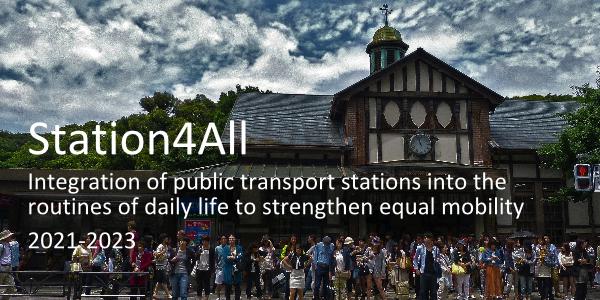Station4All

The Station4All project aims to integrate public transport stations into the routines of daily life to strengthen equal mobility.
Client: BMK, FEMtech research projects, 7th call for tenders
Duration:July 2021 to June 2023 (24 months)
Project partners: ÖBB Holding AG; Vienna University of Technology; Municipality of Neumarkt am Wallersee; SPAR Österreichische Warenhandels-AG; Elisabeth Oberzaucher E.U.
LOI partners: Salzburg Transport Association; Province of Salzburg – Department of Public Transport and Transport Planning; Municipality of Seekirchen am Wallersee; WIMEN Association; Province of Tyrol; ÖBR – Austrian Council for the Disabled; NÖVOG; Wiener Linien; Association of the Railway Industry; Aston University Birmingham – Rail Research Centre
Project description: For environmental and socio-political reasons an increase in the supply and quality of public transport is necessary especially in peripheral rural regions, which can be expected to increase the use of environmentally friendly public transport and is an essential basis for creating equal participation in social life.
A recent survey by the VCÖ regarding the expansion of public transport in accordance with Covid-19 shows that 97% of the respondents consider the expansion of the public transport infrastructure to be important or very important. The densification of public transport also for small communities and regions is seen as important by 95%.
A social imbalance manifests itself especially in structurally weak peripheral rural regions. From basic services to career opportunities through appropriate education and choice of profession, a lot depends on local structures and in particular on possible mobility, which in peripheral rural regions is strongly focussed on automobility. Due to a lack of offers, there is a disadvantage in population groups, who for various reasons do not have access or sufficient access to automobility, or for whom the time budget creates a significant additional effort due to prevailing basic social assumptions (e.g. higher care-work effort for women).
Attractive public transport can ensure equality in mobility, whereby all stages of the travel chain must be attractive. Important are railway stations and stops (public transport stations) in peripheral rural areas, which represent an interface between regions and public transport but often only meet the normative minimum requirements. At the same time, public transport services that are perceived as unattractive combined with underdeveloped structures for daily life (local supply, education, etc.) lead to an increased use of motorised private transport and, especially among young adults, to an increasing rural exodus that must be counteracted.
The aim of the Station4All project is to conduct in-depth research into the extent to which the often very different needs of various groups of people are taken into account or neglected, in order to develop clear instructions for action to improve regional and public transport service quality. The focus is on regional public transport stations, which are often only rudimentarily equipped compared to public transport stations in agglomeration areas. On the other hand, these public transport stations represent an important interface to public transport for the local population and, beyond that, to diverse activities and offers. In order to encourage different groups of people to use public transport more or to offer equal mobility in general and at the same time to strengthen the structurally weak regions, it is necessary to integrate public transport stations in peripheral rural regions into daily life.
In peripheral rural regions, it can be observed that shops in petrol stations
often represent the last remaining social centres. With the environmental and transport policy goals of strengthening public transport, it must be possible to transfer precisely this function increasingly to public transport stations. The currently unequal access to services of general interest, in particular to technical, social and cultural infrastructures, has a special role to play in the development of measures that make a significant contribution to the creation of equal living conditions. The task of this project is to take an in-depth look at the requirements from the point of view of the various groups of people, especially those who are socially disadvantaged, and to develop effective measures based on this that lead to an increase in the use of public transport and regional public transport stations and enable equivalent living conditions, such as local supply or a distribution of jobs and training places.
The result of Station4All is an aggregated catalogue of specific measures for the best possible integration of public transport stations into daily life, which includes both the needs of commuters based on gender- and diversity-specific requirements as well as feasibility from an economic and technical point of view. The clear added value is the development of measures that involve all relevant population groups equally, that can be expected to have a high level of acceptance, and that strengthen equal, sustainable and networked mobility as well as structurally weak regions. The measures are developed together with and based on the example of the pilot municipality of Neumarkt am Wallersee in Salzburg and provide the solid foundation for further effective and efficient developments. This catalogue of measures will be available to all station operators and public bodies. It is intended in particular to serve the project participants ÖBB and SPAR as an essential basis for future redesigns offering the municipality of Neumarkt the opportunity to take on a pioneering role. Likewise, the results are to be carried into standardisation committees via the ÖBB holding company.
Contact: DI Dr. Bernhard Rüger
